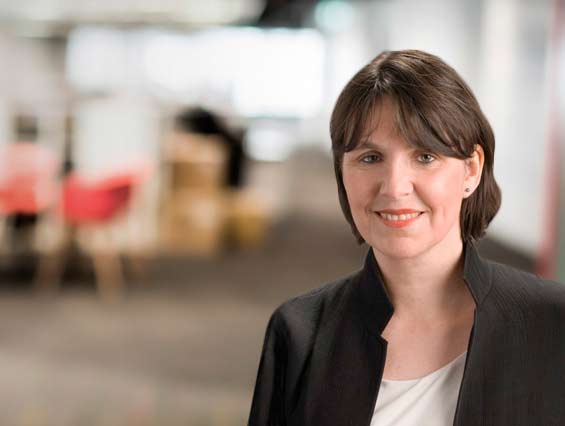Katrin Kaeufer, president and executive director at the Presencing Institute
[rows]
[columns size=»6″]
The research and thoughts of Katrin Kaeufer are a wind of change for the complex structures of the financial system. Her experience on just banking shows us several keys to understand the steps that the banking system are taking right now to build its future. She serves as the president and executive director at the Presencing Institute. She also oversees the research activities at PI. She is Senior Research Fellow at the Community Innovators Lab (CoLab) at MIT’s Department of Urban Studies and Planning. Her research focuses on leadership, social transformation and socially responsible banking. She has consulted with mid-sized as well as global companies, non-profit organizations, the World Bank and with the United Nations Development Program in New York. She is also co-founding member of the Presencing Institute. Her recent book (2013) which she co-authored with C. Otto Scharmer is titled «Leading from the emerging Future: From Ego-system to Eco-system Economies».
We talk to Katrin Kaufer, cofundadora, president and executive director at the Presencing Institute.
[/columns]
[columns size=»6″]

[/columns]
[/rows]
Katrin, you are one of the most important researchers in socially responsible banking. What are the main trends at this moment? Which countries are the most advanced on this matter?
Just banking differs according to region and country and can be found all over the world. Europe has a strong group of just banks that are focused on ecological challenges; just banks in South America are often focused on microfinance; in the US we see several just banks in community or rural development. But the most important trend comes from the outside, namely through digitalization. We do not know how this trend might affect just banking, but we do know that this will radically change the banking sector. Crowdfunding, fintechs or mobile banking are examples for innovations and the question is how can these innovations be used with a “just banking” perspective.
Do you know any public policy that fosters just banking or an economy based on values?
Across different regions of the world, public policy is mainly dominated by mainstream banking. The lobbying work of big banks is one of the reason. But you find examples of public policy that supports just banking all over the world, such as the Community Reinvestment Act in the US or the support of Sparkassen and regional banks in Germany. What is lacking is an awareness of the impact of regulation on just banks as well as any other small bank.
Why did you decide to get involved in the study of the socially responsible banking?
Banks decide our future when they take investments and lending decisions. Without banks that share the focus on addressing the social and ecological challenges that we face as society we will not be able to address these challenges. This inspired me to start working with just banks.
There are cases of public policies that support just banking, suchs as the Community Reinvestment Act in th US or the Sparkassen and regional banks in Germnay
Are the people more aware of their responsibility in the economy than 10 or 20 years ago? In which way?
We see a shift in awareness about the role of our economic system in general and its impact. We also see that businesses realize two things. First, that they can help address the urgent challenges we face as societies through the way they operate, and, secondly, that the impact of their business beyond the boundaries of their organizations is something they can not longer ignore. For example, if a company has to firefight the public back-slash from the fact that some of their suppliers are using child labor or energy companies that watch the divest movement begin to target them. It becomes harder and harder for businesses to ignore the impact of their businesses on society and nature.
Could you explain us the change from ego-system to eco-system economies? How could this phenomenon change the world?
The shift from ego-to eco-system economies describes a change that we see today in many communities and businesses. Economic theory describes our individual self-interest as a main driving force for economic activities. But the obvious question is, what is included in my self-interest? Is it just my immediate pay-check, or my sense of purpose and accomplishment, or my community or my children? The shift from ego-to eco-system economies describes this broadening and widening of our “self-interest” that we observe today. In a nutshell, it describes the ability of acting from my individual interest as well as from the interest of whole, whether the whole includes nature, my community, my family, the staekeholders of my company, etc.
The banking system in Europe is quite worried about the negative interest rates and the rising of the fintech companies. Do you think that the financial institutions are living a new age?
Yes, the low or negative interest rates are radically changing the financial sector. This disruptive change, combined with the digitalization, will shape the banking sector in the future. The low/negative interest rates basically mean, that there is too much money and no investments options. And the digitalization is basically a process where entrepreneurs cut out selective elements of the banking business and build their own business around this. There are many voices that doubt that we will still have banks as we know it in 8-10 years from now.
The low or negative interest rates and the digitalization are changing the banking business and many voices doubt that we will have banks as we know it in 8 or 10 year from now
Is the size of the banks an obstacle to approach their customers?
The larger a bank, the more difficult it is for the bank to stay connected to the local customer. Standardization of banking allows for cost cutting and standardization always means moving away from the individual customer needs.
Several years ago, bankers believed that the best way to survive was by creating banks too big to fail. Do you think the size is a total guarantee for survival?
If a bank is “too big to fail” they have the guarantee that either government, and with that citizen, jump in to rescue or the economy as a whole goes down with the bank. So, yes, it is a guarantee. The issue is, and we see that outlined in Basel III, that these banks not only pull down a country but have a global impact.
One of the challenges of just banking is the scalability. Is it possible to be a just bank with hundreds of billions in assets?
I do not know. There are no examples. We argue that an important anchor of a mission is the ownership structure of a bank. But this alone is not a guarantee for keeping the mission alive. Banks deal with a legal construct, money. Money can be digitalized and moved within seconds. As a result, it takes a lot of intention to keep a mission in a bank as a main decision criteria
Why the transparency is a key in the development of just banking?
There is no way to create criteria to for every decision in just banking. So, as a result, to integrate values and a mission into banking requires dialogue and flexibility. Transparency is therefor key. If the depositors do not have access to information about impact, an important tool of accountability is missing!
Read the interview in Spanish here.




















